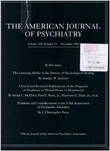Depressive episodes and dysphoria resulting from conjugal bereavement in a prospective community sample
Abstract
Using three waves of interviews from the New Haven Epidemiologic Catchment Area Program, the authors contrast the extent and nature of depressive episodes and dysphoria between newly bereaved (N = 39) and married (N = 1,047) respondents age 45 and older. Bereavement greatly increased the risk of both conditions. This observation did not appear to be an artifact because psychosocial risk factors were similar for the bereaved and married groups. Bereavement increased the risk for a depressive episode more among respondents who reported no prior dysphoria than among those who did. Among those meeting criteria for depression, the bereaved reported symptoms similar to those of the married group except for significantly fewer reports of guilt.
Access content
To read the fulltext, please use one of the options below to sign in or purchase access.- Personal login
- Institutional Login
- Sign in via OpenAthens
- Register for access
-
Please login/register if you wish to pair your device and check access availability.
Not a subscriber?
PsychiatryOnline subscription options offer access to the DSM-5 library, books, journals, CME, and patient resources. This all-in-one virtual library provides psychiatrists and mental health professionals with key resources for diagnosis, treatment, research, and professional development.
Need more help? PsychiatryOnline Customer Service may be reached by emailing [email protected] or by calling 800-368-5777 (in the U.S.) or 703-907-7322 (outside the U.S.).



